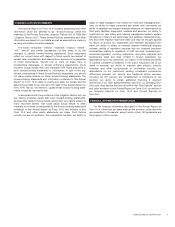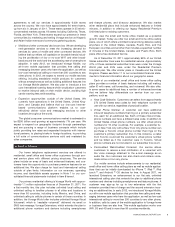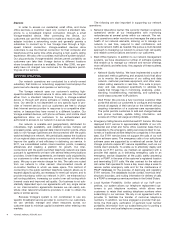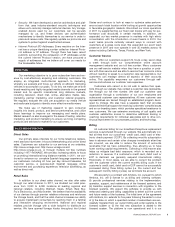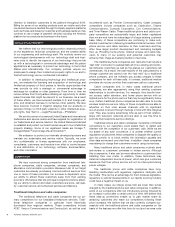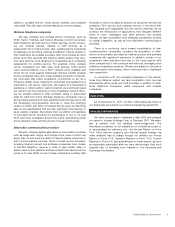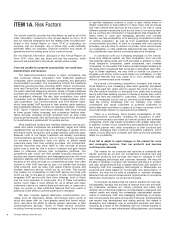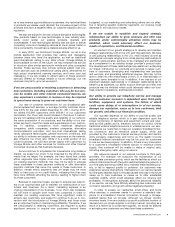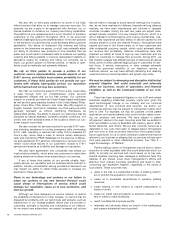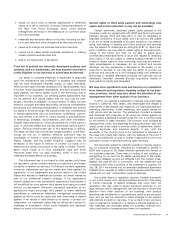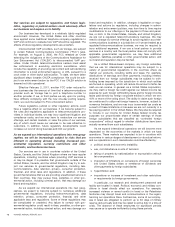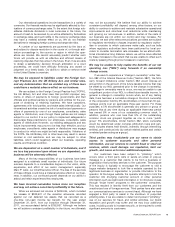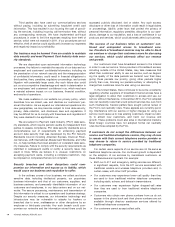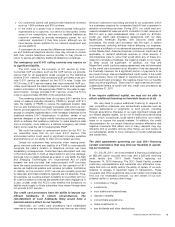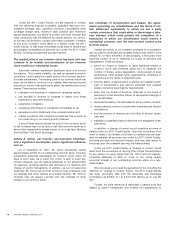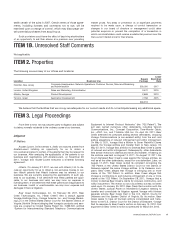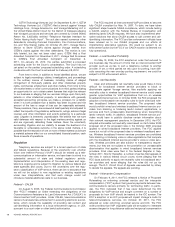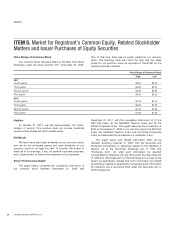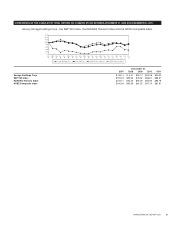Vonage 2011 Annual Report Download - page 19
Download and view the complete annual report
Please find page 19 of the 2011 Vonage annual report below. You can navigate through the pages in the report by either clicking on the pages listed below, or by using the keyword search tool below to find specific information within the annual report.>cause our stock price to decline significantly or otherwise
cause us to fail to meet the continued listing requirements of
the New York Stock Exchange, which could distract
management and result in the delisting of our common stock
from the exchange;
>materially and adversely affect our liquidity, including our abil-
ity to pay debts and other obligations as they become due;
>cause us to change our business methods or services;
>require us to cease certain business operations or offering
certain products and services; and
>lead to our bankruptcy or liquidation.
If we fail to protect our internally developed systems and
software and our trademarks, we may become involved in
costly litigation or our business or brand may be harmed.
Our ability to compete effectively is dependent in large part
upon the maintenance and protection of systems and software
that we have developed internally based on open standards.
While we own eight internally developed U.S. issued patents, have
a number of pending patent applications, and have acquired third
party patents, we cannot patent much of the technology that is
important to our business. Our pending patent applications may
not be granted. Any issued patent that we own may be chal-
lenged, narrowed, invalidated, or circumvented. To date, we have
relied on copyright and trade secret laws, as well as confidentiality
procedures and licensing arrangements, to establish and protect
our rights to this technology. We typically enter into confidentiality
or license agreements with our employees, consultants, custom-
ers, and vendors in an effort to control access to and distribution
of technology, software, documentation, and other information.
Despite these precautions, it may be possible for a third party to
copy or otherwise obtain and use this technology without author-
ization. Policing unauthorized use of this technology is difficult.
The steps we take may not prevent misappropriation of the tech-
nology we rely on. In addition, effective protection may be
unavailable or limited in some jurisdictions outside the United
States, Canada, and the United Kingdom. Litigation may be
necessary in the future to enforce or protect our rights or to
determine the validity and scope of the rights of others. That liti-
gation could cause us to incur substantial costs and divert
resources away from our daily business, which in turn could
materially adversely affect our business.
The unlicensed use of our brand by third parties could harm
our reputation, cause confusion among our customers, and impair
our ability to market our services. To that end, we have registered
numerous trademarks and service marks and have applied for
registration of our trademarks and service marks in the United
States and abroad to establish and protect our brand names as
part of our intellectual property strategy. If our applications
receive objections or are successfully opposed by third parties, it
will be difficult for us to prevent third parties from using our brand
without our permission. Moreover, successful opposition to our
applications might encourage third parties to make additional
oppositions or commence trademark infringement proceedings
against us, which could be costly and time consuming to defend
against. If we decide to take limited or no action to protect our
trademarks, our trademark rights may be diluted and subject to
challenge or invalidation, which could materially and adversely
affect our brand in the marketplace.
Certain rights to third party patents and technology may
expire and not be extended, or may not be available.
Certain previously disclosed patent rights granted to the
Company under our agreements with AT&T and Sprint will expire
between January 2013 and May 2014. It may be necessary to
negotiate extensions of such rights, and if so and we are unable
to do so on terms acceptable to us upon expiration, our making,
using, and selling of existing and future products and services
may be subject to challenges as infringing AT&T or Sprint pat-
ents. In addition, we may seek to obtain rights to third party tech-
nology in the future, but may not be able to agree upon
commercially reasonable terms or at all with respect to obtaining
such rights. If we are unable to extend existing licenses or are
unable to obtain rights to other technology that may be commer-
cially advantageous or necessary for our product and service
offerings, we may experience a decrease in the quality of our
products or services or we may lose the ability to provide our
products and services on a non-infringing basis until alternative
technology or suitable alternative products and services can be
developed, identified, obtained (through acquisition, license or
other grants of rights), and integrated.
We may incur significant costs and harm to our reputation
from lawsuits and regulatory inquiries related to our busi-
ness practices, which may also divert the attention of our
management from other aspects of our business.
In 2010, we reached a settlement in several purported class
actions in California, New Jersey, and Washington that alleged a
wide variety of deficiencies with respect to our business practices,
marketing disclosures, e-mail marketing, and quality issues for
both phone and fax service. The settlement included a release
and dismissal with prejudice of all consumer claims against us
and provided a settlement benefit of $4,750 into a common fund
for the benefit of class members. The common fund included all
awarded fees, costs, and expenses (including attorneys’ fees and
costs), some of the costs to provide notice of settlement, admin-
istrative expenses, and incentive awards, if any, with the
remainder of the common fund to be distributed to members of
the class who timely filed claims, with the balance of the fund, if
any, to be distributed cy pres to charity if approved by the court
pursuant to a plan of allocation among class members.
We have been subject to periodic regulatory inquiries regard-
ing our business practices, including an investigation settled in
2009 with a group of 32 States attorney generals into certain of
our business practices. There was no finding of any violation or
wrongdoing by us, and the 32 states participating in the settle-
ment have released us and our affiliates from the matters inves-
tigated. We paid $3,000 in connection with the settlement and
compliance with other provisions of the settlement is ongoing. On
July 18, 2011 we entered into an amended settlement agreement
initiated at our request to reflect revised business practices asso-
ciated with our new “consumable” product offerings.
Any similar claims or regulatory inquiries, whether successful
or not, could require us to devote significant amounts of monetary
or human resources to defend ourselves and could harm our
reputation. We may need to spend significant amounts on our
legal defense, senior management may be required to divert their
attention from other portions of our business, new product
launches may be deferred or canceled as a result of any proceed-
ings, and we may be required to make changes to our present
and planned products or services. If, as a result of any proceed-
ings, a judgment is rendered or a decree is entered against us, it
may materially and adversely affect our business, financial con-
dition, and results of operations and harm our reputation.
VONAGE ANNUAL REPORT 2011 11


